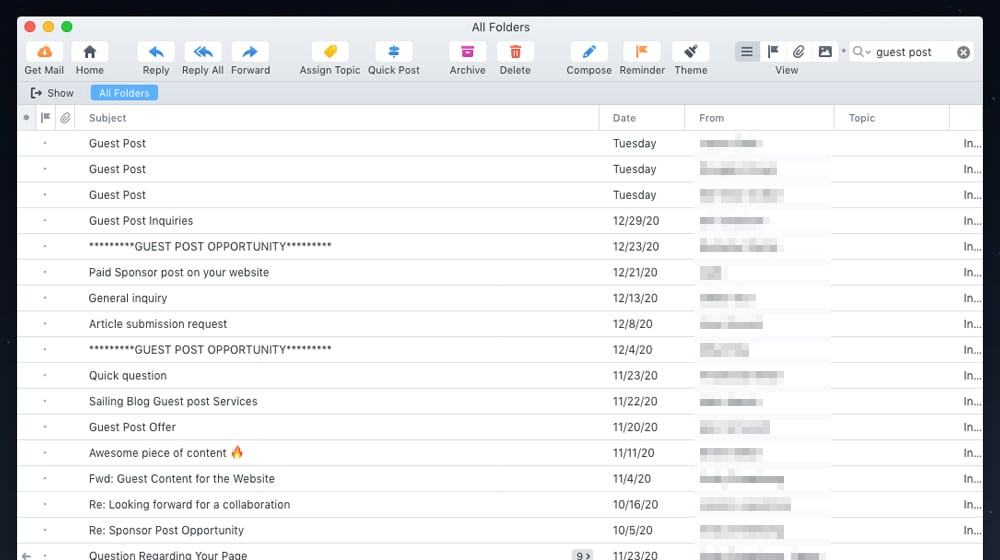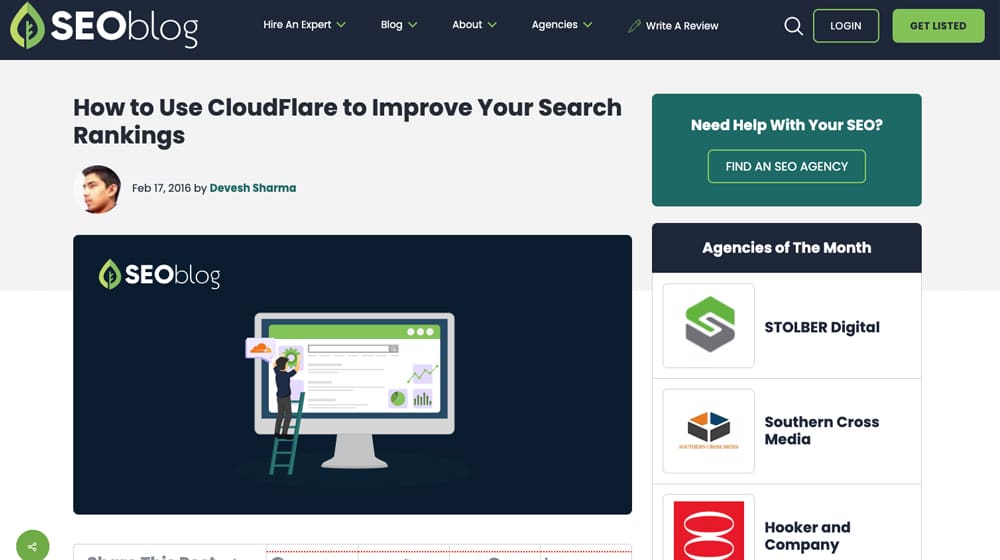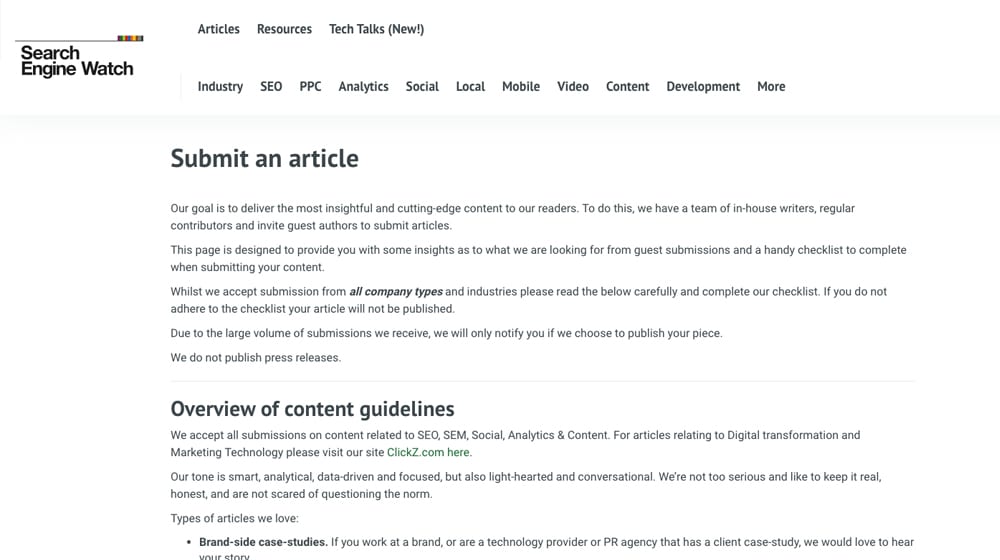Why Are People Emailing Me to Guest Blog for My Site?

Most of the time, when I'm writing a post for this blog, I'm assuming my readers have at least a passing familiarity with the industry or the subject I'm writing about. Sometimes, though, it's worthwhile to reexamine that assumption and teach something that most of us take for granted or "just know."
In this case, one thing I want to discuss and reexamine is the concept of unsolicited guest posting requests. It's a common occurrence, and most of us bloggers dismiss it out of hand, but it occurs to me that a lot of newcomers to blogging might not know what the deal is and why we ignore it.
So, let's talk about it!
The Phenomenon
First, I want to describe the phenomenon in question. You own a business, and you're starting a blog. Maybe you've been running it for a few months, or maybe a year or so, but you're starting to pick up steam. You're getting daily visitors. You've got all the trappings of a good blog established, and that means you have contact information on your page.
So you're checking your email, and you're noticing something.

You're getting a lot of emails that look a little something like this example from BlogClarity:
As an avid blogger, your blog [blog name] has been a great resource for all blogging queries. I especially like your post, "Title of Recent Blog Post," great suggestions for visual, navigation and content to keep in mind for my blog!
On behalf of my client NAME, I would like to send you a piece to read about, "Unrelated Blog Post Topic" complete with tips on how to promote your blog through hosting themed parties and events. The content will be offered exclusively for the YourBrand blog and will be crafted to harmonize with your voice and values.
Furthermore, it will be insightful and practical, NOT advertorial. If this is something you think you and your readers would be interested in I would be happy to send you the post to read in which you can determine whether or not it is a good fit for your audience.
Or, you know, something like it. There are a ton of different variations to this pitch, but the core message is always the same:
- "I found your blog and like it."
- "I have a blog in a similar niche."
- "I would like to publish content on your blog with a link to my own in it."
Some of them might go deeper on the value proposition. Some of them might be on the behalf of a client, while others are for themselves. Some of them will take pains to point out something specific and relevant with their posts, though most will not. Some won't even link to the blog they want you to promote.
So, what's going on here?
What's Going On Here?
To adequately describe what's going on, we need to dig into the history of guest posting a little bit.
Guest posting is a form of blog networking. You as a blog owner approach another blog owner. You say "hey, I like your stuff, and I think I'd be a good fit to write something for your blog. Up for it?" However you decide to couch the proposition, it's always the same.
The goal is simple. The other blog has an audience that is different from your audience, but in the same industry and topic, around the same size or larger.

By writing content for that blog, you gain quite a bit of value.
- You gain exposure to their audience, building brand awareness for your website and author awareness for you personally.
- You get a link on their site. This can refer traffic to your site and, if it's not set to
rel="nofollow", it can give your website some extra SEO value and authority. - You gain a networking connection with the blog owner. If the post performs well for them, you can leverage this for future opportunities and partnerships.
- You open the door to a reciprocal post; they write something for you, with a link to their site, and return the favor.
All of this is valuable to your site. While the traffic you get out of guest posting might be questionable, there are a ton of variations on the technique and the value you get out of it. More importantly, like normal blogging, it's a long-term prospect. The incremental value you get out of a single guest post compounds as you leverage your growing reputation to work with other, larger bloggers, and eventually, work your way up to major sites in your industry.
It was so bad for a while that the official representative of Google's WebSpam team, Matt Cutts, wrote a post decrying it and saying "guest blogging is dead".
Millions of words online have been written about how this is both true and false, about how Cutts was only referring to low-quality guest posting, how to go about guest blogging in a reputable and high-quality way, and on and on.
If you read that Matt Cutts blog post, you'll see something interesting. He has an example of a spammy blog outreach email in his post that looks suspiciously like the one above. He wrote that post seven years ago and, while the industry has changed a lot, it's still relevant today.
Here's the truth about guest blogging today:
This is why the requests are so generic and formulaic; they're wide-spread scattershot in every site the spammer can find with a contact form. That's why you get hundreds or thousands of those emails; the spammers use bots to "automate outreach" or they hire a shady outreach service to do it for them. That's why we all ignore them; they're almost always low-quality requests from low-quality websites.

Now, are there some genuine requests in there? Rarely, but every once in a while, maybe. After all, if you want to reach out to a blog owner, how are you going to do it? Probably through their contact form.
Why are these people reaching out to you? It's not because they like and admire your site, especially if you're a small company with a small blog and a small readership. No, all they see is that you're a site in good standing with Google and from a relevant industry.
They're in it for the numbers. If they can get 100 people to publish their crap, they get a temporary boost to their SEO and may get some traffic to promote their affiliate links, or they run some ads to monetize their site.
What Are the Benefits of Saying Yes?
I get it; some of these pitches can be quite tempting. I ran a site for a long time specifically dedicated to guest posting. I know all of the tricks and techniques to use to get someone to say yes to a guest post. It's a great value proposition, after all, and that's why so many people are trying to get it.
So, let's look at the potential benefits and the potential risks of saying yes.

First, the benefits.
- You get free content for your site. I'm a blog manager; I know how difficult it can be to produce enough content to fill an editorial calendar with a regular schedule. Having a slot filled with free content sounds great at first.
- You might get some promotion in return. Some of these offers are reciprocal; they graciously allow you to write content for their site and get a link in return. Seems nice, right?
- You might get paid. No small number of these guest post spammers out there will offer some kind of compensation for the guest posting slot, usually some money. Usually, this is between $5 and $50, depending on the size of your site.
Seems alright at first glance. Let's get into some of the downsides.
What Are the Risks of Publishing Them?
There are quite a few risks to publishing unsolicited guest posts on your site.

Here are some of the most critical things to consider:
- The content you promise to publish could hurt your site. It might be spun content. It might be extremely generic content they bought for $5 from Textbroker. It might be plagiarized from another site that has already published this content.
- Most of the content you'll get from them is going to be valueless. At least 99% of the time, the sites asking for you to publish their guest posts are extremely low quality, if not outright spam. Many of them are sandboxed or blacklisted by Google, so they're giving you at best zero SEO value.
- The site might not even be real. Many times, these sites are a part of a private blog network. They're drawing your SEO value into their network, making themselves look less sketchy, essentially "laundering" link juice through you. This even has the potential to backfire and drag your site down with you if their PBN is penalized. More on that in a bit.
- Their link might not be relevant to your site. Most of the time, these guest blog spammers aren't even looking at what your website is about - they're using software to scrape millions of websites. Look at the website they want to promote - if it has nothing to do with your industry, it's safe to ignore.
- The links look spammy. Google is very good at determining when a website links to a source naturally to cite their facts, and when they're linking to a website for SEO value. If there are keyword-match links like "buy scuba equipment" or "cheap CBD vapes", it's obvious what keyword they're trying to rank for, and it's obvious to Google as well. If your editorial process overlooks this and publishes this kind of spam, it does not reflect well on you.
- Your traffic could drop. In some cases, the website you're linking to can be actively detrimental and can result in a penalty. This is what is known as a bad link neighborhood. If Google penalizes a large group of websites linking to a spam site with the same keyword, and you're part of that group, you could get caught up in this link scheme. If you search around a bit on Google, you'll find plenty of examples of sites that saw massive drops in traffic and business after publishing a guest post like this.
At best, you get a neutral or valueless link, some generic content that won't drive any traffic, and maybe $15. At worst, your site is penalized by Google for violating the Webmaster Guidelines, and you'll have to work to audit and delete the offending content in hopes of lifting the penalty.
If it sounds to you like the person emailing is probably getting the better end of the deal, you would be correct.
Should You Ignore Guest Posts Emails?
Remember how up above I talked about how guest posting is a valuable strategy, and then I mentioned how the legitimate channels for guest posting are identical to those used by spammers? Yes, that's a conundrum. What if there's a legitimately valuable outreach opportunity buried in that pile of emails?
It's a 1 in 10,000 chance, but sure, it can happen. And, again, I ran a business focused on guest posting for a long time. I know there's real value in it and real people do it.
Between the sites I manage, they yield tens of millions of visitors per year. Among all of them, over the past 10 years, I can only think of one legitimate guest blogger who submitted quality content and who wasn't trying to spam. Thanks, Devesh Sharma!

The other emails were all spam.
The trick is, it's an advanced technique. It's something experienced content marketers should handle, not newcomers to blogging. It's not something you should just blindly believe out of your inbox. You don't believe in the Nigerian prince who has a million-dollar check to give you, and you shouldn't believe in the myth of endless quality content for free, either.
If you want to avoid missing any of these opportunities, it's going to be a lot of work. I bet you'll get tired of it before you get a solid lead, but hey, maybe I'm wrong and you have a good one sitting there already. If you want to check and filter them, here's how.
- Read through the email. Is it appropriately personalized, showing knowledge of who you are and what you write? Or does it feel more like a form letter with a few blanks filled in for your brand? Did they address you by name, or did they say "Hi there"? Is their email from a company email address that matches their website, or is it a Gmail account with a fake name created for spam?
- Consider the pitch. Was the article already written and attached in the email, or are they pitching you an idea? Guest blog spammers are most likely to already have content written up to serve their purposes.
- If it passes the sniff test, does it specify what site it's representing? If they're asking for a link, what site are they linking to? If they aren't asking for anything in return, do they still mention who they are? If not, disregard them.
- Look at the site they're promoting. If you search for it on Google, do any results show up, or is it deindexed?
- Run their domain through analysis; what is the Domain Authority? What kind of backlinks do they have? What's their spam quotient?
- What does their site look like? Do they have a logo? Do they include unique images, or just stock photos or photos stolen from Google image search?
- Look at the sites they link to. Are they unrelated? Are they just other vaguely-related blogs like yours? Or are they high-quality sources with facts and information supporting their posts?
- Look up the author. Do they have a social media presence? Do they show up on other sites, and what quality are those sites? Did they make up a fake name and email?
- Read the content from start to finish. Check it for plagiarism with Copyscape. Does it come up as plagiarized or stolen? See if it's above the average word count. Check it on Grammarly to see if it has errors. I have some gripes with Grammarly and their false-positives, but it will light up like a Christmas tree for garbage content. How well does it read? Did it teach you something? Is the topic too generic, or tightly focused on something relevant to your audience?
- Check all of the links in the guest post. The sole reason spammers send these emails is to promote their website, so see if you can find it. Guest blog spammers love linking to homepages primarily, but also to product and services pages. Can you find any spam links, or are they all linking to quality pages to cite their facts?
If they pass all of the above, it might be worth considering. Over 99% of the time, you'll find it fails most (or all) of these checks.
I would wager that every single email you get asking about a guest post is going to fail these checks. I also guess that you're going to get tired of scanning through them when they all fail over and over.
What About Real Guest Posts?
Now, let's say you want to leave the channel open for guest posting, but you don't want to go through all of this trouble reading unsolicited messages. What can you do?
My recommendation is to set up an official "guest post for us" page on your site.

You can use a contact form there (though it will be spammed), or you can just write instructions on how to do it. Here are my recommendations:
- Write strict requirements. Make sure whoever submits a pitch knows that you're picky and you only accept extremely high-quality content from good sites.
- Claim you'll strip all links and find your link to their site, as relevant. This will stop most people who are trying to filter SEO through a single page or include other promoted links they don't tell you about.
- Ask for a pitch rather than a full piece of content. Many spammers just have pre-written content ready to go and won't put in the effort to develop a unique pitch.
- Add a "trap" filter. A common one is "email us with the subject line X" with a specific subject line showing they follow instructions; ignore anyone who doesn't. You can also request a specific keyword in their email or something else that you can use to filter emails and reject unsolicited requests.
This filters out most of the spammers, though some will still try to slip through. From there, you just have to be willing to audit the site of a submitter and reject those who don't pass muster.
Alternatively, just ignore these. If you want a guest post on your site, ask a blogger for it. Anyone asking you to publish their content is after a link; anyone you ask for content is being asked because of their quality.
Hopefully, this clears up some things for those of you who haven't been in the content marketing game for a decade like I have.
Feel free to ask me questions, though! I respond to all comments on this site and would be happy to help.










March 17, 2021
Thank you for sharing this. I'm pretty tired of reading these emails, I get a few of these at least every week...
March 25, 2021
Hey Calvin! I am blind to these by now, I get hundreds of them per month, no exaggeration. Some of them email me a dozen times in a week under different names trying to promote the same site. It gets pretty annoying - just mark as spam and move on 🙂
March 25, 2021
I feel silly for replying to these now. Didn't know they were just automated emails.
March 25, 2021
Hey Alex!
I mean, over 98% of them are automated, but now and again a real one squeaks through. It's pretty safe to ignore these though.
The obvious spammy ones are easy to catch, but sometimes I read them out of curiosity. Some of their pitches are better than others. It's fun to look at the content that they want me to publish too, they are usually riddled with errors and boring fluffy content that nobody wants to read.
July 01, 2021
Good stuff. Like the idea of putting up a "guest post for us page". I can have their article submitted and it will be easier for me to check if it's worth to feature in my blog
July 08, 2021
Hey Regina,
I'm happy that helped! It keeps things a little more organized.
You can throw some spam traps in that form, too, to avoid automated submissions.
February 03, 2022
Oh, so that's what it is! I frequently get emails like this. I didn't know they were mostly automated.
February 04, 2022
Hey Sooraj!
Glad I could help 🙂 these are almost always automated. They get annoying over time.
July 26, 2022
Thank you very much for share this great helpful information with us.
July 28, 2022
You're welcome!
August 01, 2022
This extremely superb buddy! Thanks for Sharing this Amazing content.
August 01, 2022
Hey Mukles, you're welcome - I'm happy it helped you.
December 24, 2022
Very good and creative method for building backlinks to your site and also traffic. It’s very good! Thanks a lot for this post!
December 29, 2022
You're very welcome!
August 08, 2024
Great info here
August 13, 2024
Thank you, glad it was useful to you!
September 02, 2024
This is a nice article and very useful.
September 02, 2024
Thank you Neel!